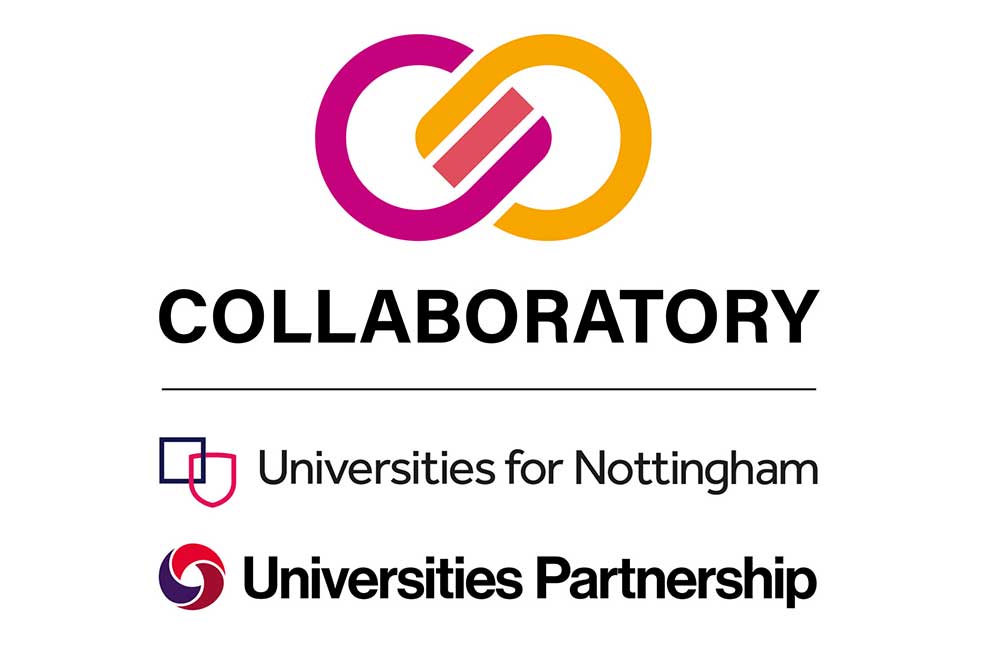Leicestershire’s universities invite local residents with life and skills experiences to apply for community-focused research projects
The University of Leicester, De Montfort University and Loughborough University are inviting people from the local community to apply for paid, full-time PhD, and part-time Placement research projects that aim to improve the lives of communities across Leicester, Leicestershire and Rutland.
By Sarah McLeod | Published on 5 June 2025
Categories: Press office;

The Collaboratory programme is an eight-year ambitious project that commenced in 2022, initially as part of the Universities for Nottingham Civic Agreement before bringing in the three Leicestershire universities – along with the Leicestershire Universities Partnership Civic Agreement into the fold from April this year.
The Programme aims to bring together academia and the community to support growth and development within communities, broaden prospects, drive change, and improve wellbeing.
The research projects have been created to solve real-life problems in the community, designed following input from researchers and those involved in local civic and community organisations.
Applications are open now, and the project team is looking for individuals, particularly those with a professional or community-centred background; those with experience and passion for creating positive change in the community are invited to apply. Successful PhD applicants will undertake a paid, three-year period of research on the fully funded Doctoral Training Programme, resulting in a PhD qualification. Successful Research Placement applicants will undertake a paid, part-time period of research, over 10 weeks, resulting a formal Certificate of Recognition.
Professor Richard Thomas, Pro Vice Chancellor Research and Enterprise at the University of Leicester, said: “I would urge anybody with a passion to create positive change in our local community to apply for these PhD and placement projects. We’d particularly like to hear from researchers from non-traditional backgrounds who would like to develop their academic skills”.
Professor Mike Kagioglou, Deputy Vice-Chancellor Planning, Research and Innovation at De Montfort University said: "At De Montfort University, we are deeply embedded in the heart of Leicester and committed to ensuring that our research reflects and responds to the needs of our communities. Collaboratory is an exciting opportunity to bring new talent into the research landscape — people with real lived experience and a passion for making a difference.
"These projects are about working with communities to tackle challenges that matter to them. We’re proud to be part of a project that breaks down barriers and redefines what research excellence can look like, and we’re really looking forward to seeing applications from people who want to create lasting, positive change.”
Professor Emily Keightley, Associate Pro Vice-Chancellor for Vibrant and Inclusive Communities at Loughborough University, said: “We’re delighted to be working with our Collaboratory partners to drive a new community-centred approach to doctoral research. These newly-launched PhD projects are an exciting opportunity to create meaningful change for the people of Leicestershire and Rutland”.
The PhD projects that are available explore challenges such as:
- Understanding the factors that influence children’s financial literacy skills in Coalville
- Energy for All: Spreading the benefits and broadening engagement in community energy projects in Leicester, Leicestershire and Rutland
- The role of community-centred organisations and social enterprises in addressing “invisible” local poverty.
- Rethinking models and policies for first and last mile travel – connecting rural areas beyond city boundaries.
- Transformative and innovative strategies for improving social support, educational outcomes and opportunities for children, young people and families in Leicester
- Identifying nurse perspectives in suicide safety planning and risk management for children and adolescents in Leicester.
- Inclusive Heritage in Superdiverse Places: Redesigning inclusion in heritage content, practice, and policy in Leicestershire
Applications close on Sunday 29 June 2025.
Anyone interested in applying is welcome to attend an information webinar which will introduce the Collaboratory programme, provide an overview of the research projects, how to apply and what the expectations are. Full details can be found on the Collaboratory website.
More information about the Collaboratory Programme.
Notes for Editors
Press enquiries please contact Sarah McLeod, Corporate Communications Manager, on telephone +44 (0)115 848 8735, or via email.
About Universities for Nottingham
The Universities for Nottingham initiative is a pioneering collaboration which brings together the combined strength and civic missions of 11 anchor institutions from across Nottingham and Nottinghamshire. Working with local communities and partners we aim to improve levels of economic prosperity, educational opportunity, environmental sustainability and health and wellbeing for the benefit of our people and place.
As part of the response to the challenges we collectively face, the Universities for Nottingham Civic Agreement sets out our joint plans for the future working as a partnership.
Find out more at www.universitiesfornottingham.ac.uk #UnisForNottingham
Universities Partnership
This Civic Agreement is a commitment between De Montfort University, Loughborough University, University of Leicester, and the city and counties of Leicester, Leicestershire and Rutland to work together for the benefit of local people and the prosperity of our places. ‘Universities Partnership’ combines the collective strengths of our universities and civic institutions to make a greater impact through collaboration for, with and among our communities. This Civic Agreement marks the beginning of a journey, signalling a commitment by the partners to bring together our collective skills, expertise and social capital and collaborate in the long-term interests of our communities.